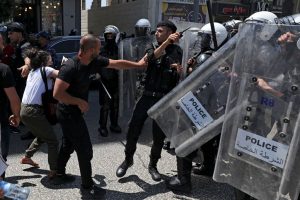Palestinian Prisoners No One Talks About
source: The Gatestone Institute
- The Palestinian Islamic Jihad prisoners, who have been convicted of terrorism against Israel, received wide coverage because they are being held in Israeli prisons. They are being held in prison because many of them were involved in major terror attacks against Israel, including murder. The international media and the Palestinian Authority (PA), however, refuse to call the prisoners terrorists. Instead, they call them “militants” or “political detainees.”
- While the world’s attention remains focused on the Palestinians held in Israeli prisons, there is hardly any mention of prisoners and detainees held by the PA security forces in the West Bank
- A Palestinian who goes on hunger strike in a Palestinian prison can only dream of being noticed by a foreign journalist or a human rights organization in the US and Europe. A Palestinian who declares a hunger strike in an Israeli prison, on the other hand, has nothing to fear. He or she knows very well that within minutes the whole world will learn about his “grievances.”
- A report by the Committee of the Families of Political Detainees revealed that the Palestinian security forces committed 217 “violations” against Palestinians just during September.
- If Abbas cares so much about Hamas and PIJ prisoners, why is he ordering his security forces to arrest and beat Palestinians for being affiliated with the two groups? If he thinks that these prisoners should be released from Israeli prisons, why doesn’t he first release those who are being held in Palestinian prisons?
- A final, damning question: Why are the Palestinian security forces arresting or interrogating prisoners shortly after their release from Israeli prisons? How can the PA condemn Israel for arresting these men, but later arrest them on suspicion of belonging to Hamas or PIJ?
- In public, Abbas demands that Israel free all the prisoners; but when Israel complies, he rushes to arrest them for “security reasons.” The Palestinian prisoners were lucky when they were in Israeli prisons: they attracted the attention of human rights organizations and journalists around the world.
- Those who are now being held in Palestinian prisons are undoubtedly wishing that they could be sent back to Israeli prisons, where they would be better treated and win international sympathy.
 |
A recent hunger strike by Palestinian Islamic Jihad (PIJ) prisoners held by Israel caught the attention of many journalists and media outlets. Reports about the hunger strike appeared in newspapers around the world and were included in dispatches by major news agencies.
The PIJ prisoners, who have been convicted of terrorism against Israel, received wide coverage because they are being held in Israeli prisons. They are being held in prison because many of them were involved in major terror attacks against Israel, including murder. The international media and the Palestinian Authority (PA), however, refuse to call these prisoners terrorists. Instead, they call them “militants” or “political detainees.”
While the world’s attention remains focused on the Palestinians held in Israeli prisons, there is hardly any mention of prisoners and detainees held by the PA security forces in the West Bank.
The international media and most human rights organizations do not care about them because they are being detained and imprisoned by Palestinians, and not by Israel. Moreover, no one seems to care about the Palestinians who are languishing in Palestinian prisons and detention facilities when they go on hunger strikes.
As far as the Western mainstream media and many international human rights defenders are concerned, a hunger strike launched in protest of the PA or Hamas has a very different — and infinitely lower — standing than one targeting Israel.
A Palestinian who goes on hunger strike in a Palestinian prison can only dream of being noticed by a foreign journalist or a human rights organization in the US and Europe. A Palestinian who declares a hunger strike in an Israeli prison, on the other hand, has nothing to fear. He or she knows very well that within minutes, the whole world will learn about his “grievances.”
The PA, meanwhile, continues to display duplicity towards the issue of the prisoners. Hardly a day passes without Palestinian leaders condemning Israel for holding convicted terrorists. This is the same Palestinian Authority that continues to hold many Palestinians without trial and denies them basic rights such as meeting a lawyer or family members.
Many of those arrested by the PA security forces almost on a daily basis are suspected of affiliation with rival groups, such as Hamas and PIJ. It is good that the PA is cracking down on Hamas and PIJ terrorists. It is not good, however, when the PA condemns Israel for doing the same thing.
Most of the PA’s Hamas and PIJ detainees, however, are never formally charged or brought to trial before a court. Palestinians refer to these arrests as “political arrests.”
Recently, Palestinian activists launched a campaign on social media platforms to protest the “political arrests” carried out by the Palestinian security services.
A campaign, titled “Political Arrests Are a Crime,” came in response to a recent increase in the number of arrests carried out by the Palestinian security forces.
Among those targeted by the Palestinian security services are university students, ex-prisoners who spent time in Israeli prisons, and activists affiliated with various Palestinian factions.
A report by the Committee of the Families of Political Detainees revealed that the Palestinian security forces committed 217 “violations” against Palestinians just during September.
The “violations,” the committee said, include 52 arrests, 62 summons’ for interrogation and five cases of physical assault and beating. The committee renewed its call for the release of detainees held by the Palestinian Authority.
In another report, the committee named some of the people recently incarcerated without trial by the Palestinian Authority.
Raed Halayka, Nour al-Qadi and Yahya al-Qadi were arrested in Hebron; Izzat al-Aqtash and Mu’tasem Ramadan were arrested in Nablus; Mohammed al-Azmi was arrested in Jenin; Salam Manasreh was arrested in Tulkarem and Mahmoud al-Zaghloul was arrested in Qalqilya.
On October 19, a Palestinian human rights group said that the practices of the security services that restrict rights and freedoms have increased recently, especially after the killing of anti-corruption activist Nizar Banat, who was beaten to death by Palestinian security officers in June.
The group, called Center for Democracy and Rights, said that the practices of the Palestinian security forces “attempt to impose a dictatorial reality on the Palestinians,” and added:
“… the perpetration of human rights violations by the Palestinian Authority’s organs harms the human rights situation and poses a threat to the lives of citizens and their rights as guaranteed in the Palestinian Basic Law and the agreements that enhance the human rights situation.”
According to the Palestinian group Lawyers for Justice, 17 Palestinians political activists are currently facing trial in a Palestinian court on charges of participating in protests following the killing of Nizar Banat.
PA President Mahmoud Abbas never misses an opportunity to praise all the prisoners held by Israel, including those affiliated with Hamas and PIJ. He has repeatedly described these prisoners as “heroes” and “freedom fighters” although many of them were involved in terrorist attacks that killed and injured thousands of civilians. Additionally, Abbas has made it clear that he will never sign a peace agreement with Israel unless all Palestinian prisoners are released from Israeli prisons.
One might ask: If Abbas cares so much about Hamas and PIJ prisoners, why is he ordering his security forces to arrest and beat Palestinians for being affiliated with the two groups? If he thinks that these prisoners should be released from Israeli prisons, why doesn’t he first release those who are being held in Palestinian prisons?
A final, damning question: Why are the Palestinian security forces arresting or interrogating prisoners shortly after their release from Israeli prisons? How can the PA condemn Israel for arresting these men, but later arrest them on suspicion of belonging to Hamas or PIJ?
In public, Abbas demands that Israel free all the prisoners; but when Israel complies, he rushes to arrest them for “security reasons.” The Palestinian prisoners were lucky when they were in Israeli prisons: they attracted the attention of human rights organizations and journalists around the world. Those who are now being held in Palestinian prisons are undoubtedly wishing that they could be sent back to Israeli prisons, where they would be better treated and win international sympathy.
Khaled Abu Toameh is an award-winning journalist based in Jerusalem.
see the article at its source here:
https://www.gatestoneinstitute.org/17880/palestinian-prisoners

